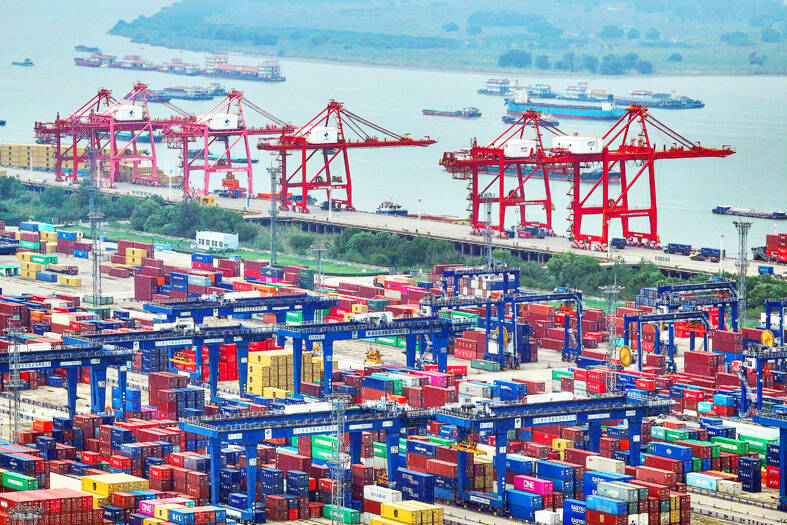China hopes to rebuild its supply chain by wooing Taiwanese businesses at this year’s Cross-Strait CEO Summit (CSCS) to be held today in the Chinese city of Xiamen, a source said yesterday.
This year’s summit would focus on “building a cross-strait industrial chain in the new era and promoting cross-strait economic integration and development,” promotional materials for the event said.
The aim is to encourage Taiwanese businesspeople who have exited the Chinese market to return and invest there as a means of countering various technology export controls that China has been encountering, the source said.

Photo: AFP
Former premier Liu Chao-shiuan (劉兆玄) and former Beijing mayor Guo Jinlong (郭金龍), the summit’s co-chairs, are expected to deliver speeches at the event’s opening ceremony.
Chinese Communist Party (CCP) Politburo Standing Committee member Wang Huning (王滬寧) attended the event last year, during which he read a letter from Chinese President Xi Jinping (習近平) and delivered a speech. However, it has not been determined whether he would attend this year, the source said.
Other Taiwanese attendees include former vice-premier Woody Duh (杜紫軍) and former minister of economic affairs Yiin Chii-ming (尹啟銘), both Chinese Nationalist Party (KMT) members, as well as former KMT vice chairman Steve Chan (詹啟賢).
However, Third Wednesday Club (三三會) chairman Lin Por-fong (林伯豐), who is known to be close to Beijing, pulled out of the event at the last minute saying he had “something else” to take care of, sending the organization’s secretary-general in his place.
Some Taiwanese industry leaders had not initially planned to attend, but later agreed to do so after Beijing threatened that they should “carefully consider the consequences of non-attendance,” the source said.
“They were worried that investments and company offices in China might be put under pressure, and in the end, they had no choice but to attend the summit in a low-key manner,” the source said.
Beijing has also recently used “soft and hard tactics” to pressure Taiwanese businesspeople not to withdraw from China, the source said.
“At the same time, Taiwanese businesspeople are being invited, through contacts in China and Taiwan, to participate in investment events in Xinjiang Province, Tibet and other places,” they said.
Citing an example, the source said that a former Mainland Affairs Council official who is a member of the KMT had been scheduled to lead a delegation of Taiwanese investors to Xinjiang in September, but the plan was canceled after it was exposed by the media in Taiwan.
The government has warned Taiwanese technology investors who enter the Chinese market that doing so could impact their future prospects.
This is particularly the case for investors who are found to be an accomplice of Russia’s invasion of Ukraine, which China has been found to be supporting through trade, the source said.

MORE VISITORS: The Tourism Administration said that it is seeing positive prospects in its efforts to expand the tourism market in North America and Europe Taiwan has been ranked as the cheapest place in the world to travel to this year, based on a list recommended by NerdWallet. The San Francisco-based personal finance company said that Taiwan topped the list of 16 nations it chose for budget travelers because US tourists do not need visas and travelers can easily have a good meal for less than US$10. A bus ride in Taipei costs just under US$0.50, while subway rides start at US$0.60, the firm said, adding that public transportation in Taiwan is easy to navigate. The firm also called Taiwan a “food lover’s paradise,” citing inexpensive breakfast stalls

US PUBLICATION: The results indicated a change in attitude after a 2023 survey showed 55 percent supported full-scale war to achieve unification, the report said More than half of Chinese were against the use of force to unify with Taiwan under any circumstances, a survey conducted by the Atlanta, Georgia-based Carter Center and Emory University found. The survey results, which were released on Wednesday in a report titled “Sovereignty, Security, & US-China Relations: Chinese Public Opinion,” showed that 55.1 percent of respondents agreed or somewhat agreed that “the Taiwan problem should not be resolved using force under any circumstances,” while 24.5 percent “strongly” or “somewhat” disagreed with the statement. The results indicated a change in attitude after a survey published in “Assessing Public Support for (Non)Peaceful Unification

PLUGGING HOLES: The amendments would bring the legislation in line with systems found in other countries such as Japan and the US, Legislator Chen Kuan-ting said Democratic Progressive Party (DPP) Legislator Chen Kuan-ting (陳冠廷) has proposed amending national security legislation amid a spate of espionage cases. Potential gaps in security vetting procedures for personnel with access to sensitive information prompted him to propose the amendments, which would introduce changes to Article 14 of the Classified National Security Information Protection Act (國家機密保護法), Chen said yesterday. The proposal, which aims to enhance interagency vetting procedures and reduce the risk of classified information leaks, would establish a comprehensive security clearance system in Taiwan, he said. The amendment would require character and loyalty checks for civil servants and intelligence personnel prior to

The China Coast Guard has seized control of a disputed reef near a major Philippine military outpost in the South China Sea, Beijing’s state media said, adding to longstanding territorial tensions with Manila. Beijing claims sovereignty over almost all of the South China Sea and has waved away competing assertions from other countries as well as an international ruling that its position has no legal basis. China and the Philippines have engaged in months of confrontations in the contested waters, and Manila is taking part in sweeping joint military drills with the US which Beijing has slammed as destabilizing. The Chinese coast guard